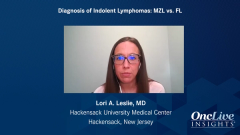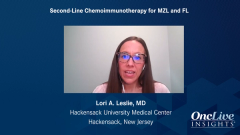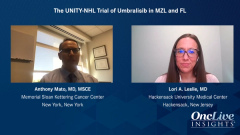
Combination Therapy With Umbralisib in MZL and FL
Lori A. Leslie, MD, and Anthony Mato, MD, MSCE, comment on the potential safety and efficacy of the PI3K inhibitor umbralisib in combination with a CD20 antibody in marginal zone and follicular lymphoma.
Episodes in this series

Anthony Mato, MD, MSCE: What about combinations with PI3K inhibitors? The mantra in oncology is that if 1 is good, 2 is better, 3 is better, and 4 is better. What are your thoughts about combining a drug like umbralisib with a CD20 antibody? The U2 [umbralisib and ublituximab] regimen has been looked at not only in CLL [chronic lymphocytic leukemia] but in lymphomas as well. What are your thoughts about that combination? Do you see that being the future of this agent, or do you see it as a monotherapy?
Lori A. Leslie, MD: The combination with a CD20 has been really encouraging. CD20s are well tolerated in general with a nonoverlapping toxicity profile, and there certainly can be maybe some immune synergy. I’m not sure how we’re activating the immune system with PI3Ks that may make it particularly appealing to combine with a CD20. Combining with other targeted agents initially was incredibly appealing given the place in the B-cell receptor pathway, and the efficacy. But early on, it seemed like a lot of those studies had unexpected serious toxicities. I believe a PI3K and SYK inhibitor unexpectedly had a very high rate of pulmonary fibrosis. We have to be very careful moving forward with PI3Ks with the general toxicity profile and combining with other targeted agents, but I am very encouraged by the combination with a CD20. Where do you use the U2 [umbralisib and ublituximab] regimen? I know you’ve probably looked at it in clinical trials. What are your feelings?
Anthony Mato, MD, MSCE: It’s not approved in CLL, but I’ve used it extensively in CLL and in patients with lymphomas across clinical trials. I’ve had a very favorable experience with it. The UNITY-CLL study reported on at the ASH [American Society of Hematology] meeting was a frontline regimen, which speaks very well to the AE [adverse event] profile because none of other PI3K inhibitors have even made it through a randomized phase 3 trial in that setting because their adverse event profiles weren’t favorable. That is important. This raises an important aspect to highlight: whether we actually use these drugs. I have used idelalisib. I have used duvelisib. I have not used copanlisib. I have used umbralisib. Have you used umbralisib in your practice on trials? Have you prescribed it for patients?
Lori A. Leslie, MD: I have used it in trials. We are participating in UNITY-NHL. I have used umbralisib in a consolidative CLL study trying to let patients stop their BTK or venetoclax, designed by this smart guy I know, Anthony Mato. I’m not sure if you’ve heard of him. I had good experience with the U2 [umbralisib and ublituximab] regimen there. Patients tolerate it well. But I have not prescribed it as standard of care yet since its approval in February 2021.
Anthony Mato, MD, MSCE: I recently made my first prescription as standard of care. We’re both talking about the forefront of management of these lymphomas, where we’re talking about agents that were approved just a month ago. We’re both getting our feet wet in practice, but it’s safe to say we’ve used this drug about 100 times between the 2 of us. We do have a lot of experience using it.
Transcript Edited for Clarity














































